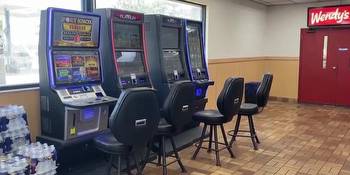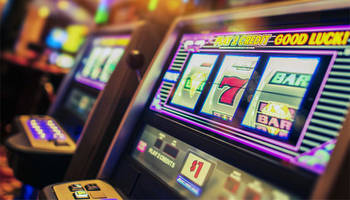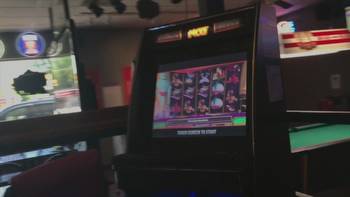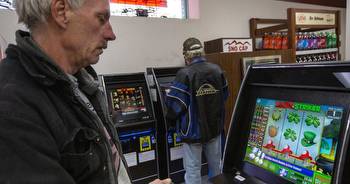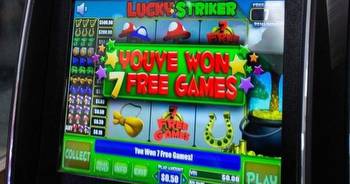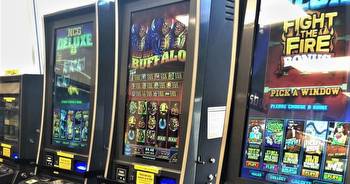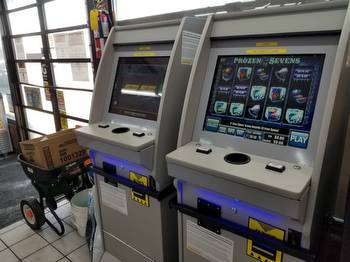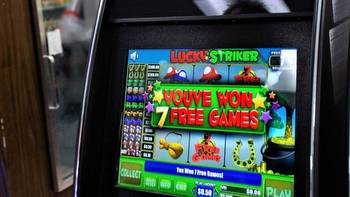As unregulated gambling machines flood Missouri, many argue they put children at risk
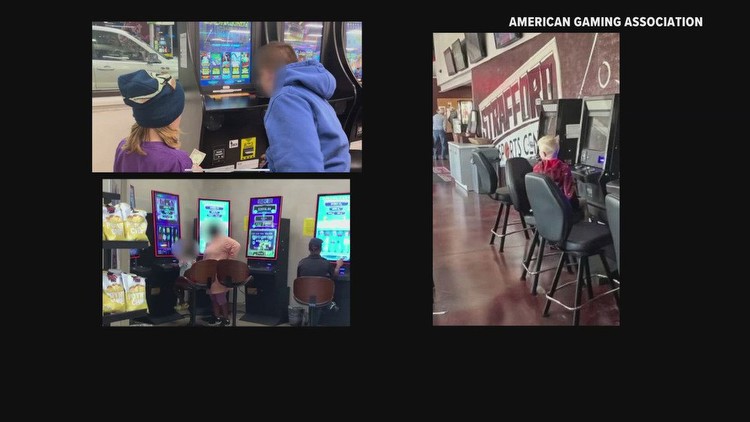
Missouri casinos mandate players are at least 21 years old, but unregulated machines lack restrictions, according to the American Gaming Association.
ST. LOUIS — There's a controversial debate in Missouri that has led to the unchecked proliferation of gaming machines, commonly seen at gas stations and convenience stores. The debate over the legality of these machines has reached a boiling point.
The state of Missouri limits gambling to the confines of its 13 licensed casinos, which contribute billions in tax revenue to education and local communities, according to the Missouri Gaming Association. Online gambling and sports betting are also illegal in Missouri.
In 2023 alone, licensed casinos in Missouri contributed $461 million in taxes directly from gaming revenue, according to the American Gaming Association.
But now, unregulated gaming machines are sprouting up everywhere. We visited a gas station in Kirkwood to see these controversial devices firsthand. Nineteen-year-old Sean Crosier lives nearby.
“It's a serious thing for sure," he said.
He said most places do not even check ID.
"It's becoming too accessible for kids my age," said Crosier. "I definitely have a fair amount of buddies that I know who have lost a good amount of money through gambling.”
Missouri casinos require a minimum payout. They also mandate players are at least 21 years old. But unregulated machines lack restrictions, according to the American Gaming Association, an industry group representing casinos. The association wants a complete ban on unregulated gaming machines and opposes efforts to legalize these devices, which they argue would reward those who have circumvented the law and profited from unregulated gambling.
Photos obtained by the I-Team show kids appear to be customers. The footage of children appearing to play at gaming machines at gas stations and convenience stores was provided by the American Gaming Association. A spokesperson said it was obtained through representatives from an organization called NoMoSlots, a coalition of over 12,000 Missourians who oppose the spread of unregulated slot machines throughout the state. The group is supported by the state’s casino industry.
A spokesperson with the American Gaming Association said the footage includes a video of a child gambler, which was recorded on January 27, 2023, at a gas station in Columbia. Another photo shows two kids gambling, which was taken at a gas station in Kirksville in February 2023. Another photo shows a child alone at a machine at a sporting center in Strafford in early 2023.
“People are putting themselves at risk," said Chris Cylke, a spokesperson with the American Gaming Association. He calls unregulated gaming machines a national epidemic.
“There's just a lack of transparency," said Cylke.
He said it means players are likely losing more money faster. Casinos are required by law to have a minimum payout for slot machines. Cylke said unregulated gaming devices do not have requirements when it comes to payouts, so they can set the payout to be whatever they want it to be.
UNREGULATED GAMING MACHINES
Torch Electronics, a St. Louis County company, owns thousands of the devices in the state. We called and emailed. We visited their office. They did not respond.
The I-Team followed the money. Companies cannot privately donate to politicians under the law. The way around that is through political action committees. Public records show Torch Electronics has spent about $901,670 on political action committees since 2018, according to the Missouri Gaming Association and attorney Marc Ellinger based on data from the Missouri Ethics Commission.
It’s about four times as much as what Missouri’s regulated gambling industry has raised. Missouri’s casino industry has raised about $227,000 for the Missouri Gaming PAC since it started in 2020, according to the Missouri Gaming Association.
Many believe that disparity in funding has helped certain companies evade regulation with virtually no accountability.
“The issue is getting worse," said Missouri Senator Nicholas Schroer, a Republican who represents Missouri's 2nd District.
Schroer is pushing for regulation. He faces opposition from those who question if unregulated gambling machines like those distributed by Torch Electronics constitute as gambling.
Under the law, gambling is a game of “chance” involving bets of “value.” Torch Electronics markets its machines as "no chance games." Players insert money, and have the option to push a small button to reveal if they’ll win or lose, but only on the next play.
“So you could theoretically lose $100 and win $1," asked Senior Investigative Reporter Paula Vasan.
“Correct," said Schroer. “All of these different businesses are getting away scot-free.”
“How much is lost in taxes with these machines?” asked Vasan.
“We're talking hundreds of millions of dollars a year,” said Schroer. He said the state does not collect taxes from unregulated gaming machines found in places like gas stations and convenience stores. There is no statutory funding structure as there is for regulated casino games.
Illinois legalized these gaming machines about five years ago and there are about 50,000 of them in the state, according to Marc Ellinger, an attorney for the Missouri Gaming Association. He said those games are paying taxes, doing background checks on owners, and making sure underage people are not gambling. But he said there are still thousands of illegal machines in the state and he believes it's largely because law enforcement is not cracking down on them.
For now, Crosier said gambling is always at his fingertips, from apps on his phone to his local gas station.
"You look at gambling addictions for you know, you know, middle-aged people and midlife crisis, but nowadays, it's getting to the younger kids too. And it's a sad thing to see," he said.
WHO IS RESPONSIBLE?
As legal battles persist, the future of gaming machines in Missouri is uncertain. The stakes are high, affecting both the industry and our communities.
The I-Team asked Missouri Attorney General Andrew Bailey’s Office about its position on the proliferation of unregulated gambling machines, like Wildwood-based Torch Electronics. We also asked for its response to the fact that public records show Torch Electronics has contributed hundreds of thousands of dollars to political action committees over the years, with critics questioning whether it’s allowed the company to avoid regulation.
In response, the office sent us an April press release noting that Bailey filed suit against T.J. Entertainment in Dunklin County for acting as a public nuisance to Missourians. The suit comes after his office received investigative referrals from local law enforcement surrounding the facility.
“As Attorney General, I will always use every legal tool at my disposal to protect Missourians,” said Bailey. “Illegal casinos that have been overrun with crime serve as nothing but a harm to the public. I am moving to shut this location down permanently before it can wreak any more havoc on the local community.”
Bailey has said that this type of gaming should be handled at the local level.
The I-Team asked the St. Louis County Prosecuting Attorney Wesley Bell’s Office for comments about unregulated gambling. We asked whether the office would prosecute a case if law enforcement brought a warrant application to its office on unregulated gambling machines.
A spokesperson told us “charging decisions are made on an individual basis. There is no way to answer a hypothetical charging question.”
We asked St. Louis County Police about its approach to unregulated gambling machines. A spokesperson told us they do not regulate these machines and instead enforce laws that are in place. They referred us to the Missouri Gaming Commission.
We asked The Missouri Gaming Commission whose responsibility it is to regulate the machines so that law enforcement can enforce the law.
Jan Zimmerman, chairman of the Missouri Gaming Commission, told us: “The Missouri Gaming Commission is tasked with the regulation and oversight of legal gaming operations throughout the state. The fact that countless illegal machines are being operated is, of course, great concern to us. We are bound by the existing laws within the state and prosecution is a determination made by the local prosecutors on a case by case basis.”
Michael Winter, a spokesperson for the Missouri Gaming Association, told us: “It's very disappointing local prosecutors aren’t taking action. The Missouri Gaming Commission has indicated they believe these or similar machines are illegal. The Missouri State Highway Patrol has done numerous investigations, seized illegal machines and referred cases to prosecutors. Yet many are not filing charges and taking these cases to trial which is leaving Missourians unprotected."
Right now it’s largely up to local prosecutors to interpret and enforce Missouri law. They determine what qualifies as gambling and the legality of these games.
COMPLAINTS OVER UNREGULATED MACHINES
Complaints are piling up. The Missouri Gaming Commission, which considers these machines illegal, has received about 230 complaints this year alone. So far in 2024, the Missouri Gaming Commission has received 98 online reports and 131 telephone complaints of illegal machines. The data is as of June 11. In 2023, the Missouri Gaming Commission received 215 online reports and 253 telephone complaints of illegal machines. In 2022, Missouri Gaming Commission received 174 online reports and 308 telephone complaints of illegal machines.
In 2023, the Missouri State Highway Patrol investigated 393 complaints and submitted 144 probable cause statements. So far in 2024, the Missouri State Highway Patrol has investigated 273 complaints and submitted 57 probable cause statements. No machines were seized during 2023. So far in 2024, 18 machines have been seized.
The I-Team reached out to Ron Leone, a lobbyist for the Missouri Petroleum Marketers and Convenience Store Association, for the organization’s perspective on unregulated gambling machines and reaction to concerns. We are waiting to hear back.
PROPOSED REGULATION
Regulation has been proposed in Missouri to restrict cash-prize gaming, also known as video lottery terminals.
In April, Torch Electronics filed a lawsuit against the City of Springfield in Missouri, which passed an ordinance banning these devices.
In 2020, a judge in Platte County in northwest Missouri ruled that the so-called "no chance gambling" machines are illegal.
Eric Zahnd, prosecuting attorney for Platte County, told us: “Despite the fact that so-called ‘no chance’ gambling machines are commonly seen in convenience stores and other locations across Missouri, they are illegal slot machines. In 2020, my office won a criminal trial against a distributor of those machines, and that company was found guilty of promoting gambling. Pursuant to Missouri law, those machines were later publicly destroyed. The Platte County case merely reaffirmed long-standing Missouri law: Slot machines can only be located in regulated casinos. This particular technology may be new, but the law making them illegal dates back to the early twentieth century. Even machines that theoretically give a player the opportunity to know the outcome of a game still constitute gambling.”
The I-Team reached out to Missouri lawmakers who voted against an amendment that would legalize and regulate video lottery terminals, limiting the number of them in the state, among other restrictions. We are waiting to hear back from state senators Lincoln Hough, Sandy Crawford, Mike Cierpiot, and Mike Bernskoetter.








